 Last week, in our continuation of the series on the Church, we began to look at the make-up of a church…how a church is to be structured and how it is to fulfill its mission and calling within that structure. We read, in Eph 4:11ff, that God had raised up and anointed certain men as gifts to His church…apostles, prophets, evangelists, and pastor/teachers that were called to equip the members of the church…the saints…for the work of the ministry. We saw that the goal of that “equipping” was to result in their becoming like Jesus…complete and mature in Christ. It is the last of these “gifts of men” that will be the focus of our study over the next few weeks.
Last week, in our continuation of the series on the Church, we began to look at the make-up of a church…how a church is to be structured and how it is to fulfill its mission and calling within that structure. We read, in Eph 4:11ff, that God had raised up and anointed certain men as gifts to His church…apostles, prophets, evangelists, and pastor/teachers that were called to equip the members of the church…the saints…for the work of the ministry. We saw that the goal of that “equipping” was to result in their becoming like Jesus…complete and mature in Christ. It is the last of these “gifts of men” that will be the focus of our study over the next few weeks.
We are told in Eph 4 that He gave “some as pastors and teachers, 12 for the equipping of the saints for the work of service, to the building up of the body of Christ; 13 until we all attain to the unity of the faith, and of the knowledge of the Son of God, to a mature man, to the measure of the stature which belongs to the fullness of Christ.”
Beloved, if God has placed in His church certain men for our equipping and edification…to help us become and act more like Christ…it is imperative for us to understand who they are and how they are to function. We can see, from the passage that we just read, that they are to be shepherds and teachers of the church. These same men are also referred to as “elders” and “overseers”. We can clearly see that these are all terms for the same men…or “office”… as we read Paul’s words to the Ephesian elders in Acts 20: 17ff. “ From Miletus he sent to Ephesus and called to him the elders of the church. 18 And when they had come to him, he said to them… Be on guard for yourselves and for all the flock, among which the Holy Spirit has made you overseers, to shepherd the church of God which He purchased with His own blood.”
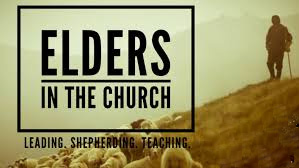 In this passage, they are identified as “elders” in reference to the position they held in the church. But just a few verses later the same men are called “overseers” and are called to “shepherd” the church of God, both referring to their function within the church. We see the same thing in 1Pet 5: 1ff where we read, “I exhort the elders among you, as your fellow elder and witness of the sufferings of Christ, and a partaker also of the glory that is to be revealed, 2 shepherd the flock of God among you, exercising oversight not under compulsion, but voluntarily, according to the will of God; and not for sordid gain, but with eagerness; 3 nor yet as lording it over those allotted to your charge, but proving to be examples to the flock.“
In this passage, they are identified as “elders” in reference to the position they held in the church. But just a few verses later the same men are called “overseers” and are called to “shepherd” the church of God, both referring to their function within the church. We see the same thing in 1Pet 5: 1ff where we read, “I exhort the elders among you, as your fellow elder and witness of the sufferings of Christ, and a partaker also of the glory that is to be revealed, 2 shepherd the flock of God among you, exercising oversight not under compulsion, but voluntarily, according to the will of God; and not for sordid gain, but with eagerness; 3 nor yet as lording it over those allotted to your charge, but proving to be examples to the flock.“
Here, also, we see Peter addressing the elders and identifying himself as a fellow elder. He then goes on to make reference to their functions…to “shepherd” the flock of God and to exercise “oversight”. Each of these terms give us insight into the role and function of these men in…and to…the church.
The term most often used to describe these men is that of “elder”. While in its simplest form it just speaks of being older, in common use it referred to men who held certain positions of authority and responsibility among the people. Men who managed public affairs and administered justice in their communities were referred to as elders of that community. Likewise, men who managed the affairs of the synagogue and religious practices were called elders as well. They were ostensibly men who, because of their wisdom and reputation, were given positions of authority and responsibility in order to serve their community. It was natural, therefore, for the apostles to use this term to denote the men they were appointing when they were establishing leadership in the churches that were being formed out of their missionary and ministerial work. It appears, as would be expected, that the apostles themselves served or functioned as elders in the church with whom they were affiliated. John identifies himself as “the elder” in 2 and 3 John and Peter identifies himself as a “fellow elder” when addressing the elders of the scattered churches in 1 Peter.
The appointment of elders to give leadership and oversight to the churches as they were founded was the common practice in the early church. In fact, we have no other example found in God’s Word. We see in Titus 1:5ff that Paul’s charge to Titus was to “set in order what remains and appoint elders in every city as I directed you”. We see this same practice in Luke’s narrative as he describes and chronicles Paul’s first missionary journey in Acts 14. In verse 23 we read, “When they had appointed elders for them in every church, having prayed with fasting, they commended them to the Lord in whom they had believed.” God established from the very beginning of the Church that it would be led and protected by spiritual men called by God, appointed to the task, and recognized by the people.
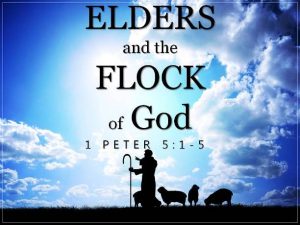 A second term used to describe these men is that of “shepherd”. In earlier studies together we looked at the responsibility and character of a good shepherd at great length. Remember what Peter says, in 1 Pet 5? “I exhort the elders among you, as your fellow elder and witness of the sufferings of Christ, and a partaker also of the glory that is to be revealed, 2 shepherd the flock of God among you, exercising oversight not under compulsion, but voluntarily, according to the will of God; and not for sordid gain, but with eagerness; 3 nor yet as lording it over those allotted to your charge, but proving to be examples to the flock.“
A second term used to describe these men is that of “shepherd”. In earlier studies together we looked at the responsibility and character of a good shepherd at great length. Remember what Peter says, in 1 Pet 5? “I exhort the elders among you, as your fellow elder and witness of the sufferings of Christ, and a partaker also of the glory that is to be revealed, 2 shepherd the flock of God among you, exercising oversight not under compulsion, but voluntarily, according to the will of God; and not for sordid gain, but with eagerness; 3 nor yet as lording it over those allotted to your charge, but proving to be examples to the flock.“
The “shepherd” is to exercise oversight out of love and concern for those under his care, in all things serving as an example to his “flock”. He goes on in the next verse and reminds them of their example to follow…the example of the Great Shepherd, Jesus Christ. This term is used to emphasize the manner in which the oversight is to be performed. It is to done with the heart and mind of a good shepherd…one who gives his life for the sheep. It is to be done freely, in eagerness and reverence for for the Great Shepherd. It is to be done for the good of the sheep, not for the good of the shepherd…not for “sordid gain”. It is not to be exercised in dominance and power but with humility and love. As we saw in earlier studies, “shepherd” was a common metaphor used for those entrusted with leadership of God’s people and was a familiar one to those tasked to aid in building the Church of God.
The final term used to denote these men is “overseer”. This term, like that of “shepherd” is reflective of their function. Both of these terms are found as both verbs and nouns in the Word, whereas “elder” is only found as a noun. A shepherd shepherds…a overseer oversees…but an elder does not “eld”. It is not surprising, then, to find different terms to describe the same office…this group of men appointed to lead. They each focus on somewhat different aspects of the office…its character, its heart, and its responsibility.
“Overseer,” then, speaks to the responsibility of the office…the duty to provide oversight, direction, and care. It is the term Paul uses when writing to Timothy in 1Tim 3:1. “It is a trustworthy statement: if any man aspires to the office of overseer, it is a fine work he desires to do.” It is an office…a responsibility…that is appropriate to “aspire to”…to be an overseer is a “fine work” to be desired.
Now, at this point you might ask, “Well, what about the position or office of “pastor”? Where does that fit in?”. The only time we find the term “pastor” is in Eph 4:11, and then only in certain translations. The translations that follow the original languages most closely translate the original Greek the same way it is most often translated elsewhere…”shepherd”. The term “pastor” simply comes from the Latin translation of “shepherd”. It is an somewhat unfortunate 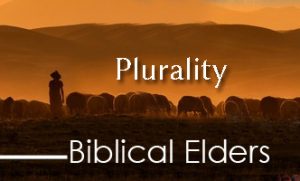 translation because it can lead us to believe that a pastor is something separate and distinct from an elder, when in reality they refer to the very same office. To add to that confusion, we in the modern church have come to believe that a church is to be led by a single pastor. While he might have support staff working underneath him…associate and assistant pastors and the like…the pastor is the top dog and the buck stops with him. This, too, is unfortunate as it stands against the clear teachings of the Word. As the early churches were founded, we see no examples of the apostles and their fellow workers appointing only one elder…they were always appointed as a group. Whenever the leadership of a church is mentioned or addressed, it is always a plurality…not “elder” but “elders”. Let’s take a look at some of the some of the passages of scripture that make this clear. Some we have already looked at.
translation because it can lead us to believe that a pastor is something separate and distinct from an elder, when in reality they refer to the very same office. To add to that confusion, we in the modern church have come to believe that a church is to be led by a single pastor. While he might have support staff working underneath him…associate and assistant pastors and the like…the pastor is the top dog and the buck stops with him. This, too, is unfortunate as it stands against the clear teachings of the Word. As the early churches were founded, we see no examples of the apostles and their fellow workers appointing only one elder…they were always appointed as a group. Whenever the leadership of a church is mentioned or addressed, it is always a plurality…not “elder” but “elders”. Let’s take a look at some of the some of the passages of scripture that make this clear. Some we have already looked at.
In Titus 1:5 we read, For this reason I left you in Crete, that you would set in order what remains and appoint elders in every city as I directed you”
In Acts 14:23 we read the same thing, “When they had appointed elders for them in every church, having prayed with fasting, they commended them to the Lord in whom they had believed.”
When Paul called the leadership of the Church in Ephesus to meet with him as he journeyed to Jerusalem, he called for the elders of the church to join him in Miletus. (Acts 20:17)
In Acts 11, when Paul and Barnabas were entrusted to bring financial relief to the struggling churches of Judea, they brought the contribution to the elders.
In James 5:14, when giving council on praying for the sick, James enjoins the one suffering to “call for the elders of the church” to pray over him.
We will look more closely at the importance of having multiple elders shepherding the church and providing oversight in later weeks, but, for now, let us just realize that the idea of a sole individual exercising leadership in a church runs counter to what we see in God’s Word.
As we continue through our study of eldership…those entrusted with the care, instruction, and leadership in the local church…we will be looking at five important truths about how they are to function and behave. We will see that elders are called to exhibit godliness, embrace accountability, exercise leadership, engage in unity, and engender loyalty. In the remainder of our time together this evening, let us begin to look at the elders call to exhibit godliness.
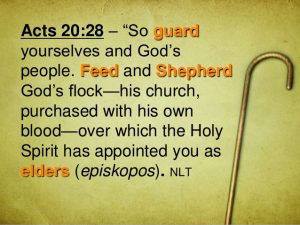 First and foremost, the call to shepherd the church of God begins with a calling by the Spirit of God to do so. Godliness can not be developed apart from God. In Acts 20:28 we read, “Be on guard for yourselves and for all the flock, among which the Holy Spirit has made you overseers, to shepherd the church of God which He purchased with His own blood.” It is the Holy Spirit who ultimately calls, sustains, and approves the men entrusted with shepherding God’s church, purchased with His blood. Is it any wonder, then, that in Acts 14 we read that elders were appointed after prayer and fasting? This is a solemn call and an awesome responsibility.
First and foremost, the call to shepherd the church of God begins with a calling by the Spirit of God to do so. Godliness can not be developed apart from God. In Acts 20:28 we read, “Be on guard for yourselves and for all the flock, among which the Holy Spirit has made you overseers, to shepherd the church of God which He purchased with His own blood.” It is the Holy Spirit who ultimately calls, sustains, and approves the men entrusted with shepherding God’s church, purchased with His blood. Is it any wonder, then, that in Acts 14 we read that elders were appointed after prayer and fasting? This is a solemn call and an awesome responsibility.
This is why in 1 Tim 3:1ff we read, “It is a trustworthy statement: if any man aspires to the office of overseer, it is a fine work he desires to do. 2 An overseer, then, must be above reproach, the husband of one wife, temperate, prudent, respectable, hospitable, able to teach, 3 not addicted to wine or pugnacious, but gentle, peaceable, free from the love of money. 4 He must be one who manages his own household well, keeping his children under control with all dignity 5 (but if a man does not know how to manage his own household, how will he take care of the church of God?), 6 and not a new convert, so that he will not become conceited and fall into the condemnation incurred by the devil. 7 And he must have a good reputation with those outside the church, so that he will not fall into reproach and the snare of the devil.”
Paul has left Timothy in Ephesus as he journeys on to Macedonia, and this letter is to give Timothy instruction in keeping the church on track in their Christian faith and walk. Timothy is in a position to evaluate aspiring elders, or “overseers”, and to keep watch over existing ones. To this end, Paul writes to him about the nece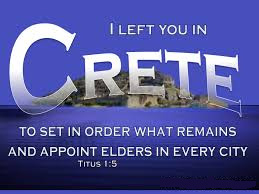 ssary spiritual qualifications for those entrusted with the oversight of the church. Paul does the same in his letter to Titus, another one of Paul’s companions and coworkers. In the same way that Timothy was left in Ephesus to maintain order, Titus was left in Crete. We read, in Titus 1:5ff, “For this reason I left you in Crete, that you would set in order what remains and appoint elders in every city as I directed you, 6 namely, if any man is above reproach, the husband of one wife, having children who believe, not accused of dissipation or rebellion. 7 For the overseer must be above reproach as God’s steward, not self-willed, not quick-tempered, not addicted to wine, not pugnacious, not fond of sordid gain, 8 but hospitable, loving what is good, sensible, just, devout, self-controlled, 9 holding fast the faithful word which is in accordance with the teaching, so that he will be able both to exhort in sound doctrine and to refute those who contradict.”
ssary spiritual qualifications for those entrusted with the oversight of the church. Paul does the same in his letter to Titus, another one of Paul’s companions and coworkers. In the same way that Timothy was left in Ephesus to maintain order, Titus was left in Crete. We read, in Titus 1:5ff, “For this reason I left you in Crete, that you would set in order what remains and appoint elders in every city as I directed you, 6 namely, if any man is above reproach, the husband of one wife, having children who believe, not accused of dissipation or rebellion. 7 For the overseer must be above reproach as God’s steward, not self-willed, not quick-tempered, not addicted to wine, not pugnacious, not fond of sordid gain, 8 but hospitable, loving what is good, sensible, just, devout, self-controlled, 9 holding fast the faithful word which is in accordance with the teaching, so that he will be able both to exhort in sound doctrine and to refute those who contradict.”
We can easily see that both lists of qualifications are very similar. But before we look at those qualities that are imperative for elders to possess, it might be wise to look at what is absent from the list. There is no demand that an elder be financially successful or wealthy. They are not required to have any social status or fame. They are not restricted to only those with higher education or prestigious degrees. They are not required to be well spoken or articulate…to be impressive public speakers. Personal charisma is not listed as a requirement, nor is popularity. While none of these are necessarily bad things, they are not important things in qualification for eldership and can often distract us from the necessary qualifications. The Israelites, when looking for a king, were swayed by Saul’s beauty and stature. The Corinthians disparaged Paul because they found his appearance and speech to be unimpressive and “weak”. It is easy for us, as well, so give unwarranted importance to things of little importance to God.
Beloved, why am I intending to spend so much time examining what God says about eldership…about how He wishes to provide leadership and direction to His church? For one reason, the church today has a woefully inadequate understanding of God’s design for His church. We can often prefer and practice the traditions of men rather than the directions of God. We can easily find ourselves falling into the same errors in thinking of the Corinthians and of Israel, looking to the world for our ideas of how God would lead and who He would use. If we fail as a church to implement God’s design for His church, we will carry with us the seeds of our own destruction and failure.
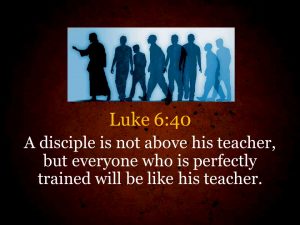 John MacArthur, a teaching elder at Grace Community Church in Los Angeles, writes, “Whatever the leaders are, the people become. As Hosea said, ‘Like people, like priest’ (4:9). Jesus said, ‘Everyone, after he is fully trained, will be like his teacher’ (Luke 6:40). Biblical history demonstrates that people will seldom rise above the spiritual level of their leadership”. These are good words for us to hear and illustrate the importance of ensuring that those in leadership in the church are the right men at the right time.
John MacArthur, a teaching elder at Grace Community Church in Los Angeles, writes, “Whatever the leaders are, the people become. As Hosea said, ‘Like people, like priest’ (4:9). Jesus said, ‘Everyone, after he is fully trained, will be like his teacher’ (Luke 6:40). Biblical history demonstrates that people will seldom rise above the spiritual level of their leadership”. These are good words for us to hear and illustrate the importance of ensuring that those in leadership in the church are the right men at the right time.
Well, it looks like we are coming up to the time to close our study this evening. Next week we will dig deeper into the qualities and character of elders…of shepherds…and see why they are of such importance. Would you do me a favor over the coming week? Would you spend some time reflecting on the nature and character of God’s leaders…the ones entrusted with the care of His people? Would you likewise spend some time praying for our church and for wisdom as we seek to move forward according to His will and Word? And most important, would you pray that our hearts would be yielded to His Spirit as we listen to His Word and seek understanding…and not to the wisdom and philosophies of the world? What a blessing that we can come before Him in prayer and find wisdom in His Word.
Let us pray.
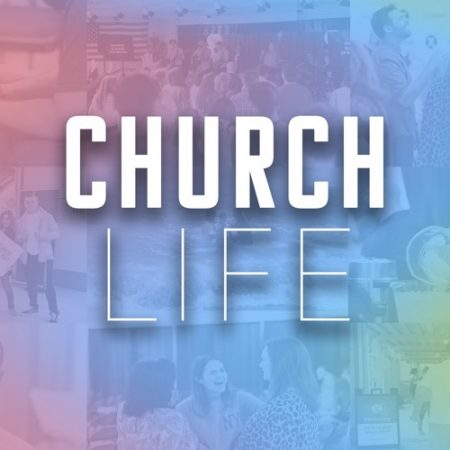

0 Comments